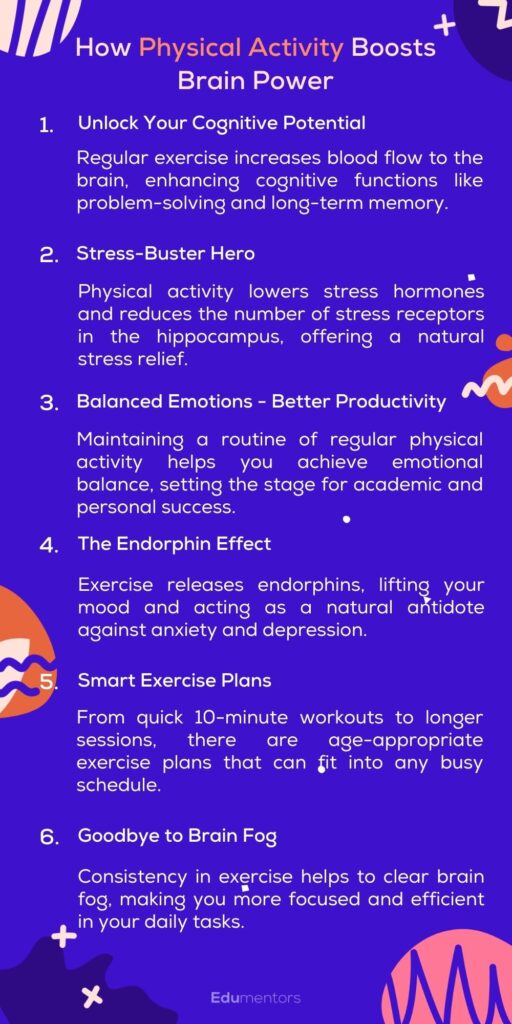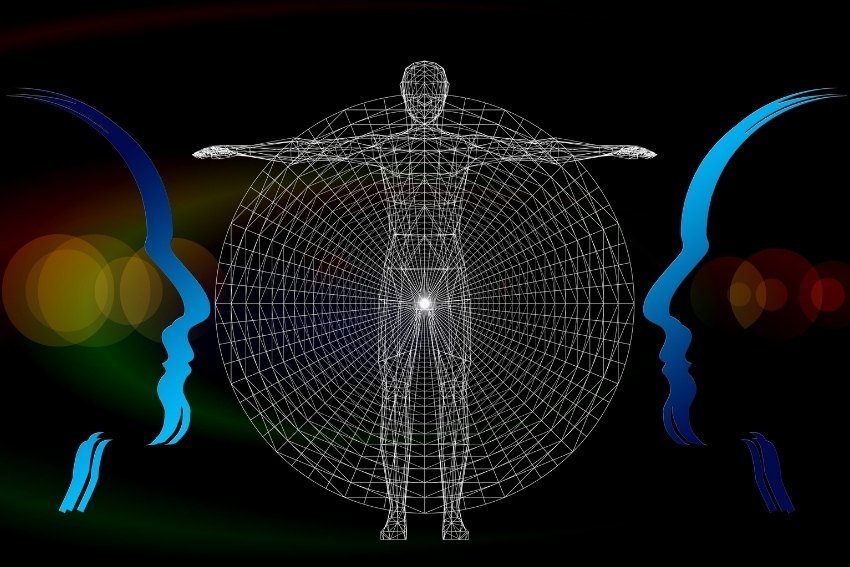How Regular Exercise Boosts Brain Productivity?
Have you ever stopped to think about the broader impacts of exercise? Sure, we all know it’s good for our physical health, but what about our mental well-being? Believe it or not, regular physical activity has profound effects on your brain and can significantly improve your mental health.
How does physical activity improve mental health?’ That’s a great question. Engaging in exercise triggers the release of endorphins, which are chemicals that act as natural mood lifters. This is a major reason why physical activity is so closely tied to mental health, including its potential to alleviate symptoms of anxiety and depression.
Exercise also has the remarkable ability to enhance cognitive functions. Whether you’re solving complex problems in school or facing the challenges of young adulthood, physical activity helps you think more clearly and problem-solve more effectively.
So, why is physical activity so crucial? Beyond its obvious physical benefits, like improved muscle tone and cardiovascular health, exercise plays a vital role in building mental resilience. It’s not just about looking good or even feeling good; it’s about a holistic approach to well-being that includes mental sharpness.
Interested to learn more? Stick with us as we explore this fascinating topic in greater detail, examining how exercise benefits not just your body, but your brain as well.

How Physical Activity Supercharges Your Brain?
If you think exercising is only for building abs and biceps, you’re missing out on half the story. Your brain is the unsung hero that reaps enormous benefits every time you get active. It’s like this: each time you move, your brain fires up, setting the stage for some remarkable changes.
Let’s kick things off with a fact you might not know: exercise is a fantastic way to increase blood flow to the brain. Picture it as a VIP escort service, ensuring that the essential elements—oxygen and nutrients—reach the grey matter upstairs. This increase in blood flow is more than just a perk; it’s essential for the health of your brain cells.
You know those times when you’re struggling to solve a maths problem or make a crucial decision? Exercise can be your go-to solution. The enhanced blood flow helps you problem-solve with the efficiency of a supercomputer. It does so by nourishing your brain cells, keeping them in tip-top shape, which eventually aids in cognitive functions like problem-solving.
Exercise Boosts Memory Capacity
Exercise does more than just charge your brain with oxygen and nutrients; it also amps up your memory storage. How? Exercise has a direct impact on the capacity of your memory. This means whether you’re studying for a big exam, trying to remember a skill, or just recalling long-term memories, exercise has got your back. It boosts your brain’s ability to form new synaptic connections, making learning and memory retention easier than ever before.
However, it’s important to note that exercise alone won’t turn you into a genius overnight. While it’s an excellent supplementary aid, you still need to hit the books and study. Struggling with your studies? Don’t sweat it; there are additional resources available. Online tutoring platforms such as Edumentors offer high-quality tuition that can prepare you for exams or simply help you keep up with your lessons. Because let’s face it, a well-rounded approach to learning combines both mental and physical wellness.
The Stress-Busting Power of Physical Activity
Life as a teenager or young adult is a whirlwind of emotions, isn’t it? One moment you’re feeling invincible, and the next, you’re drowning in a sea of stress and anxiety. Navigating the complexities of life at this age can be overwhelming. But here’s a game-changing fact: exercise can be your most reliable companion in mitigating stress.
Physical activity is more than just a way to blow off steam; it’s a science-backed method for reducing stress. Studies have shown that exercise can decrease the levels of stress hormones in the body, particularly cortisol. According to the American Psychological Association, 14% of people make use of regular exercise to cope with stress.
So, what’s the deal with cortisol? This hormone is often behind those feelings of stress-induced dread and worry. Elevated levels of cortisol trigger the body’s ‘fight or flight’ response, causing symptoms like a racing heart and sweaty palms. But here’s the good news: engaging in exercise has been shown to lower cortisol levels. In fact, a study published in the Journal of Clinical Endocrinology and Metabolism found that moderate exercise can reduce cortisol levels by up to 18%. This physiological change helps you feel more relaxed, reduces anxiety, and minimizes the impact of stress on your body and mind.
Your Brain’s Stress Management Centre
Another fascinating aspect of exercise’s stress-reducing power targets a specific part of the brain known as the hippocampus. This area is vital for a variety of functions, including emotion regulation and memory. A study in the Journal of Neuroscience found that regular aerobic exercise increased the size of the hippocampus by 2%, which is significant in neurological terms.
Why is this important? Physical activity has been shown to reduce the number of stress receptors in the hippocampus. Fewer stress receptors mean that your brain becomes more resilient in stressful situations. In practical terms, a well-exercised hippocampus helps you better manage life’s ups and downs without spiralling into panic or stress. Essentially, exercise equips your brain with the tools it needs to cope more effectively with stress.

Practical Ways to Utilise Exercise for Stress Management
So, what does this all mean for you? It means that the next time you’re feeling stressed, you’ve got a powerful tool at your disposal: exercise. It could be as simple as a brisk walk around the block, a yoga session to centre yourself, or even a high-energy dance class to let off some steam. By incorporating regular physical activity into your routine, you’re not just enhancing your physical health but also fortifying your mental well-being, setting you up to better manage life’s inevitable stresses.
Emotional Balance and Academic Productivity
We’ve all had those days, haven’t we? Days where everything seems overwhelming and you feel like you’re on an emotional seesaw. Well, there’s good news: regular physical activity can be your stabilising force. It’s not just a theory; science backs it up. Physical exercise plays an instrumental role in maintaining emotional balance, a factor that is often overlooked but is critical for your overall well-being.
So, how does regular physical activity contribute to emotional balance? Well, the science is quite compelling. According to a study published in the Journal of Affective Disorders, regular exercise can reduce symptoms of depression by up to 30%. When you engage in physical activity, your brain releases a cocktail of beneficial chemicals, including endorphins and dopamine. These chemicals act as natural mood stabilisers that help you maintain emotional equilibrium.
Not only do these neurotransmitters mitigate feelings of anxiety and depression, but they also contribute to a general sense of well-being. Another study found that people who exercise regularly report 23% higher levels of happiness compared to those who don’t. So, if you’re looking for a way to balance your emotions and feel happier, a bit of sweat could make a big difference.
How Emotional Balance Fuels Academic Productivity
But the benefits don’t stop at just feeling good. Maintaining emotional balance has a tangible impact on your academic productivity. In fact, according to a study in the Journal of Applied School Psychology, students who engage in regular physical activity have shown a 12% improvement in academic performance. Here’s why: when you’re emotionally stable, your cognitive functions are at their peak. You can focus better on your studies, grasp new concepts more quickly, and have a sharper memory.
Another study from the American Psychological Association has shown that emotionally balanced individuals experience a 25% increase in their ability to concentrate on tasks, be it academics or otherwise. So, when you’re emotionally stable thanks to regular physical activity, you’re not just happier—you’re also potentially a better student.
Exercise Routines for Emotional Stability
So, what are some exercise routines that can help you maintain emotional balance? You don’t need to run a marathon; even simple activities like jogging, swimming, or even yoga can do wonders. The key is regularity. Make exercise a constant in your life, and you’ll notice the emotional benefits it brings, including improved focus and academic productivity.
Exercise and Mood-The Endorphin Effect
You’ve probably heard of the term ‘runner’s high,’ but it’s not just a catchy phrase—it’s a scientifically backed phenomenon. Research has shown that as much as 45 minutes of moderate exercise can increase levels of endorphins by up to 20%. These are often referred to as ‘feel-good hormones,’ and they do precisely that: make you feel good.
Endorphins are your body’s natural mood enhancers. They act almost like organic antidepressants, binding to receptors in your brain to minimise discomfort and induce feelings of euphoria. According to a study published in the Journal of Clinical Psychiatry, regular exercise can increase endorphin levels by up to 25%, which explains why exercise is often recommended as a complementary treatment for mental health issues.
But the endorphin effect is far more potent than just making you feel happier. It’s a formidable force against mental health challenges like anxiety and depression. In fact, a meta-analysis published in the Journal of Clinical Psychology found that exercise could reduce symptoms of depression by up to 27%. And according to the Anxiety and Depression Association of America, exercise is considered a vital component for treating anxiety disorders, with effectiveness similar to medication for some individuals.
So, how can you unlock this treasure trove of endorphins? It’s simpler than you might think. Even a brief 20-minute jog, quick cycling session, or short swim can be enough to trigger an endorphin release. Consistency is key: making exercise a regular habit can not only improve your physical health but significantly uplift your emotional well-being as well.

Exercise Plans for a Productive Mind
One of the most common excuses people have for not exercising is a lack of time. It’s a valid concern, especially when you’re juggling school, work, friendships, and myriad other responsibilities. But let’s get one thing straight: the benefits of exercise are too crucial to ignore, no matter how packed your schedule is.
Benefits of Exercising
Let’s first talk about why exercise should be a non-negotiable part of your life. Exercise goes beyond physical health; it directly impacts your mental well-being and productivity. From improving memory to reducing stress, the benefits are multifaceted. These are not just good reasons to be physically active; they’re compelling arguments for making exercise an integral part of your daily routine.
So, you’re convinced that you should be exercising, but where do you find the time? We have some simple, age-appropriate exercise plans that can fit even into the busiest of schedules.
If you’re really short on time, even a 10-minute workout can be beneficial. This could be a quick set of push-ups, sit-ups, and jumping jacks in your bedroom.
For Those with a Bit More Time, Great! How about a quick jog around the neighbourhood or a half-hour dance session to your favourite playlist?
If you can spare an hour, that’s fantastic. This could be a trip to the gym, a long bike ride, or even a hike in nature.
The key is to find a routine that fits into your lifestyle and to stick with it. The more consistently you exercise, the more you’ll experience its wide-ranging benefits, from physical to mental well-being. So, let’s stop making excuses and start moving!

Conclusion
So there you have it! Exercise isn’t just a means to a toned body; it’s a holistic approach that profoundly influences your mental well-being. From sharpening your cognitive abilities to maintaining your emotional balance, the benefits of regular exercise are indeed far-reaching. Say goodbye to brain fog and hello to a more focused, happier you.
But let’s not forget: while exercise is a crucial part of the equation, sometimes you need that extra academic push to excel. That’s where Edumentors comes in. Whether you’re preparing for special exams or just want to keep up in class, Edumentors offers high-quality online tutoring to give you that competitive edge.
The secret to reaping these benefits? Consistency. Whether it’s exercise or academic preparation, making it a regular part of your life can unlock a myriad of advantages. You’re now armed with information and motivation, so what’s stopping you from taking action? The first step may be the hardest, but it’s also the most rewarding.
To all the young minds out there, we wish you the best of luck on this transformative journey. The road to a healthier, sharper, and more accomplished you may be paved with sweat and study sessions, but it’s also filled with opportunities for joy and success. So let’s get moving, and let’s get learning.








